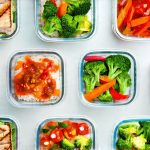Meal prepping isn’t simply about saving time; it’s about reclaiming control over your week and fostering flow state – that feeling of being fully immersed and energized in what you do. In today’s fast-paced world, decisions constantly drain our mental energy. What’s for breakfast? Lunch? Dinner? Do I have the ingredients? This constant questioning pulls us out of focus, hindering productivity and increasing stress levels. Meal prepping proactively addresses this decision fatigue by removing one significant daily burden, allowing you to channel your cognitive resources towards more meaningful tasks and experiences. It’s about building a foundation of consistent nourishment that supports sustained energy and mental clarity throughout the week, ultimately promoting a sense of calm amidst chaos.
The benefits extend far beyond mere convenience. By planning and preparing meals in advance, we’re less likely to succumb to impulsive food choices – often those quick, convenient options that don’t serve our health or wellbeing. This proactive approach allows us to align our dietary habits with our goals, whether it’s improving energy levels, managing weight, or simply feeling better overall. It encourages mindful eating and a greater awareness of what fuels our bodies. Think of it as an investment in your future self: a small commitment that yields significant returns in terms of health, productivity, and peace of mind. It’s about building habits that support long-term stability rather than quick fixes or restrictive diets.
The Foundations of Effective Meal Prep
Effective meal prep isn’t one-size-fits-all. It requires a personalized approach tailored to your lifestyle, preferences, and goals. Start small; don’t try to overhaul your entire eating pattern overnight. Begin by prepping just a few meals each week, gradually increasing the scope as you become more comfortable with the process. The key is sustainability – creating a system that fits seamlessly into your routine rather than feeling like another overwhelming chore. Consider your schedule and identify the days where meal prep will have the biggest impact. Are you busiest during weekdays? Focus on prepping weekend meals to alleviate weekday stress. You can also explore some simple urology meal prep techniques for busy weeks.
Planning is paramount. Before you even step foot in the grocery store, take some time to map out your meals for the week. This includes deciding what you’ll eat for breakfast, lunch, dinner, and snacks. Utilize recipes that share common ingredients to streamline the process and minimize waste. Don’t be afraid to repeat meals – variety is great, but consistency is more important when it comes to establishing a habit. Online resources, cookbooks, and meal planning apps can provide inspiration and simplify the planning phase. Remember to factor in dietary restrictions or preferences; this isn’t about deprivation, it’s about nourishment.
Finally, invest in appropriate containers. Reusable containers are environmentally friendly and help keep your prepped meals fresh. Glass containers are a great option for reheating food, while BPA-free plastic containers are lightweight and convenient. Portioning out meals into individual containers makes grab-and-go lunches and dinners incredibly easy, further reducing decision fatigue during busy times. A well-organized fridge with clearly labeled containers is the cornerstone of successful meal prepping.
Building a Weekly Meal Prep Routine
Establishing a consistent routine is crucial for long-term success. Designate a specific day or time each week for meal prep. For many, Sunday afternoons work best, but find what fits your schedule. Treat this as a non-negotiable appointment with yourself – a dedicated block of time to prioritize your health and wellbeing. Creating a ritual around meal prepping can also make it more enjoyable. Put on some music, listen to a podcast, or invite a friend to join you.
The actual prep process should be efficient and organized. Start by creating a grocery list based on your meal plan. Then, tackle the tasks in stages:
1. Wash and chop all vegetables first.
2. Prepare proteins (roasting, grilling, baking).
3. Cook grains or starches.
4. Assemble individual meals into containers.
Batch cooking is a game-changer. Instead of preparing each meal individually, cook larger quantities of staple ingredients that can be used in multiple dishes throughout the week. For example, roast a large batch of sweet potatoes and use them for breakfast, lunch, or dinner. Cook a pot of quinoa or brown rice to serve as a base for various meals. This reduces overall cooking time and simplifies meal assembly.
Navigating Common Meal Prep Challenges
One common challenge is boredom. Eating the same meals repeatedly can quickly become monotonous. Combat this by incorporating variety into your meal plan, even if it’s just swapping out spices or adding different toppings. Explore new recipes each week to keep things interesting. Don’t be afraid to experiment with flavors and textures – a simple change can make a big difference.
Another hurdle is time constraints. If you find yourself consistently lacking the time for extensive meal prep, consider focusing on prepping key components rather than entire meals. For example, pre-chop vegetables or marinate proteins in advance. This reduces the amount of cooking required during busy weeknights. Utilize shortcuts like pre-cooked grains or frozen vegetables when needed – there’s no shame in making things easier for yourself.
Finally, avoid perfectionism. Meal prepping isn’t about creating Instagram-worthy meals; it’s about simplifying your life and nourishing your body. Don’t get discouraged if you don’t have time to prep everything perfectly. Even a small amount of meal prepping can make a significant difference in your overall wellbeing. Focus on progress, not perfection, and celebrate your successes along the way.
Maximizing Flow Through Nourishment
The connection between what we eat and our ability to enter flow state is often underestimated. Nutrient-dense foods provide sustained energy levels, preventing mid-afternoon crashes that disrupt focus and concentration. Prioritize whole, unprocessed foods – fruits, vegetables, lean proteins, and healthy fats – over sugary snacks or processed meals that offer a temporary boost followed by a rapid decline. To further support this, consider balancing energy and stillness throughout your day.
Hydration is also crucial. Dehydration can lead to fatigue and impaired cognitive function, making it difficult to stay focused. Keep a water bottle readily available throughout the day and sip on it regularly. Consider incorporating herbal teas or infused water for added flavor and hydration. Avoid sugary drinks that provide empty calories and contribute to energy fluctuations.
Beyond macronutrients and hydration, certain foods are known to support brain health and cognitive function. Foods rich in omega-3 fatty acids (salmon, walnuts, flaxseeds) promote optimal brain function. Berries contain antioxidants that protect against oxidative stress. Dark chocolate (in moderation!) can enhance mood and focus. By incorporating these brain-boosting foods into your meal prep plan, you’re not just nourishing your body; you’re also fueling your mind for peak performance.
And remember to think about hydration mindset tips for long-term stability, as well as exploring the best low-sugar drinks for bladder stability.
For those looking to refine their meal planning around specific health needs, a look at how to design a weekly meal plan for kidney health can be extremely beneficial.





















